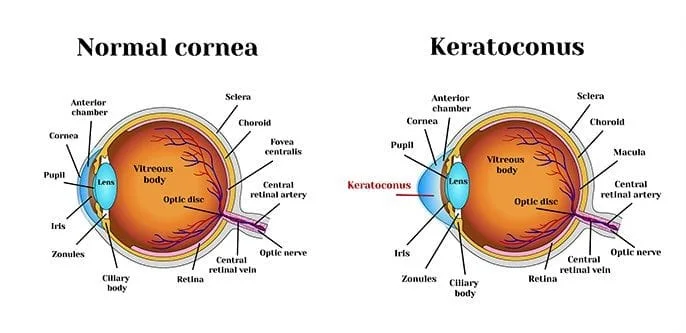A normal, healthy cornea is round. Most people don't have a perfectly round cornea, but it is very close to the shape of a ball. When the cornea begins to thin out and bulge outward into a cone shape, it causes a condition called keratoconus. Fortunately, this condition can be treated at Lock Family Eye Care in West Des Moines, IA.
Who Is At Risk For Keratoconus?
This eye condition can affect one or both eyes, and people in their teens or early twenties are at risk of developing keratoconus. Other factors can also increase your risk such as the following:
- If a member of your immediate family has keratoconus, the chances of you getting it are more significant.
- If you rub your eyes often, your cornea can wear, causing it to bulge.
- Certain medical conditions increase your risk of developing keratoconus, including Down syndrome, asthma, hay fever, retinitis pigmentosa, and Ehlers-Danlos syndrome.
What Are the Symptoms of Keratoconus?
As the cornea becomes more abnormal, it can trigger the following symptoms:
- Blurry vision
- Distorted vision
- Sensitivity to light and glare
- Swelling or redness in the eyes
How Is Keratoconus Diagnosed?
This condition can be diagnosed during an annual eye exam. Your eye doctor in West Des Moines may conduct the following tests to diagnose keratoconus:
- Slit-lamp Examination: During this test, your optometrist would use a vertical beam of light to get a good look at your cornea. Any misshapen or thinning of the cornea can be viewed with this exam.
- Keratometry: This test uses lights and reflections to determine the basic shape of your cornea.
- Computerized Corneal Mapping: This is a photograph test that can give your eye doctor a detailed shape map of the surface of your cornea. These photos are also helpful in monitoring the progression of the disease.
How Is Keratoconus Treated?
Your eye doctor can determine which course of treatment will benefit your lifestyle and needs. Below are the treatments available for keratoconus:
- Eyeglasses: In the early stages, glasses can treat your blurry vision and visual distortion.
- Gas Permeable Lenses: These hard lenses can hold your eye's round shape in a way that traditional soft lenses cannot.
- Piggyback Lenses: If you find gas-permeable lenses uncomfortable, your optometrist can prescribe a soft lens like piggyback lenses to put under the hard lens. This should improve your comfort level.
- Hybrid Lenses: Hybrid lenses are a combination of soft and hard lenses. Many people find these contacts to be more comfortable than gas-permeable lenses.
- Scleral lenses: Because of your eye shape, traditional soft lenses may not be an option. Scleral lenses don't sit on the cornea. Instead, they sit on the white of the eye and vault over the cornea.
If you are experiencing any of the symptoms of keratoconus, our optometrists at Lock Family Eye Care in West Des Moines, IA can help. To schedule an appointment, give our optometry center a call today at (515) 267-1312.



